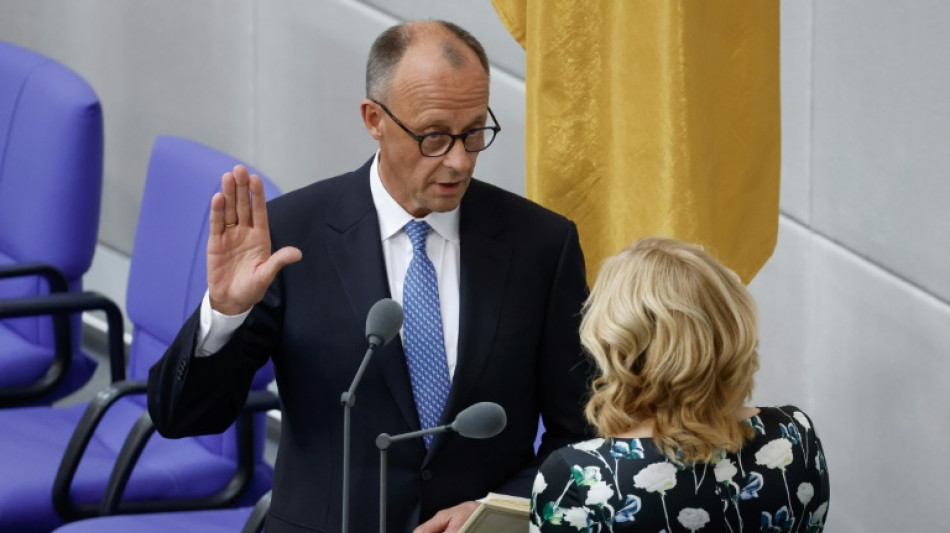
RBGPF
-0.0500


Germany's conservative leader Friedrich Merz won a nail-biting second parliamentary vote Tuesday to become chancellor after losing the first round in a stunning setback.
Merz, 69, scored an absolute majority of 325 to 289 in the second secret vote in the lower house of parliament to become the new leader of Europe's biggest economy.
But his win was bittersweet after the initial defeat -- the first such outcome in Germany's post-war history -- pointed to rumblings of discontent within his coalition.
Merz takes over at the helm of a coalition between his CDU/CSU alliance and the centre-left Social Democrats (SPD) of outgoing chancellor Olaf Scholz.
President Frank-Walter Steinmeier appointed Merz as post-war Germany's 10th chancellor ahead of his visit to Paris and then Warsaw on Wednesday.
"With a slight delay, but all the more heartfelt, my congratulations on your election," Steinmeier told Merz at the Bellevue Palace in Berlin. "I wish you every success in what lies ahead."
Merz later said: "I accept this responsibility with humility but also with determination and confidence. It is good that Germany now has a federal government with a parliamentary majority again."
"We are a coalition from the centre of the political spectrum of our country, and I am very confident that we will be able to solve the problems of our country," he said.
- 'Power vacuum over' -
Merz's bumpy victory caps a long ambition to lead Germany that was first foiled decades ago by party rival Angela Merkel, who went on to serve as chancellor for 16 years.
Nonetheless, his eventual triumph means that "the six-month power vacuum at the heart of Europe is over", said analyst Holger Schmieding of Berenberg Bank.
Schmieding said Merz's initial setback "suggests that he cannot rely on full support from the two parties backing his coalition... That will sow some doubts about his ability to pursue the policy agenda."
But, "despite today's temporary upset," he said, "Merz has a proven ability to recover from temporary setbacks. For example, it had taken him three attempts to become head of his CDU party -– but he still made it in the end."
The far-right Alternative for Germany (AfD) especially cheered the initial vote against Merz, who has vowed to restore stability in Berlin after six months of political turmoil since Scholz's government collapsed in November.
"Merz should step aside and the way should be cleared for a general election," AfD co-leader Alice Weidel said, calling the first-round result a "good day for Germany".
Merz has vowed a crackdown on irregular migration, in part to reduce the appeal of the AfD, which was last week designated a "right-wing extremist" party by Germany's domestic spy service.
On Tuesday he vowed to "do everything" to "restore people's trust in the political centre and ensure that they no longer feel it necessary to vote for a party such as the AfD".
The day's first secret vote was expected to be a formality but turned to disaster for Merz when he fell short by six votes of the absolute majority to seal his job.
- 'Profound upheaval' -
Merz has promised to revive Germany's ailing economy and strengthen Berlin's role in Europe as it responds to rapid changes since US President Donald Trump returned to power.
Trump has heaped pressure on European allies, saying they spend too little on NATO defence capabilities and imposing tariffs that are especially painful to export power Germany.
Merz, who boasts a strong business background but has never held a government leadership post, said on Monday: "We live in times of profound change, of profound upheaval... and of great uncertainty".
"And that is why we know that it is our historic obligation to lead this coalition to success."
Y.Su--ThChM